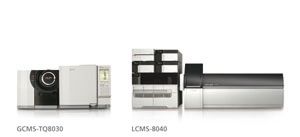Two triple quads achieve a new global standard in mass spectrometry
The two triple quadrupole mass spectrometers LCMS-8040 and GCMS-TQ8030 complete Shimadzu?s UFMS series consisting of seven powerful systems. The UFMS product family provides higher sensitivity, greater excellence in data quality, increased analytical throughput and a wider range of applications.

The two triple quadrupole mass spectrometers LCMS-8040 and GCMS-TQ8030 complete Shimadzu’s UFMS series consisting of seven powerful systems. The UFMS product family provides higher sensitivity, greater excellence in data quality, increased analytical throughput and a wider range of applications.
The LCMS-8040 expand the analytical range of Shimadzu's LC-MS/MS lineup while the GCMS-TQ8030 achieves new levels of high-speed and highly-sensitive analysis in GCMS analysis.
GCMS-TQ8030 - ultra-fast analysis meets sensitivity and accuracy
The GCMS-TQ8030 achieves the highest sensitivity in its class for multiple reaction monitoring (MRM) measurements based on UFsweeper® technology. Superior mass spectra and sensitivity at high scan speeds of up to 20,000 masses/sec is achieved using Advanced Scanning Speed Protocol (ASSP™).
The GCMS-TQ8030’s ecology mode reduces carbon dioxide emissions through a reduction of power consumption in analysis standby mode of 36 percent while also decreasing the consumption of carrier gas.
LCMS-8040 - Expanded range of ultra-fast, high-sensitivity applications
The system combines newly improved ion optics and collision cell technology with proprietary ultrafast technologies. This significantly expands the application range and ensures high-sensitivity, high-throughput analysis at lower levels of detection. A five-fold increase in sensitivity (reserpine, S/N ratio) has been achieved when compared with the LCMS-8030 model.
The LCMS-8040 is the world’s fastest LCMS/MS tandem mass spectrometer and provides multiple reaction monitoring (MRM) transition speeds of up to 555 MRMs per second. This is based on UFsweeper® II collision cell technology that maintains sensitivity and suppresses cross-talk, even for high-speed or simultaneous multi-component analyses.
For more information please visit www.shimadzu.eu.
Best of the Week: Food Analysis, Chemical Migration in Plastic Bottles, STEM Researcher of the Year
December 20th 2024Top articles published this week include the launch of our “From Lab to Table” content series, a Q&A interview about using liquid chromatography–high-resolution mass spectrometry (LC–HRMS) to assess chemical hazards in plastic bottles, and a piece recognizing Brett Paull for being named Tasmanian STEM Researcher of the Year.
Using LC-MS/MS to Measure Testosterone in Dried Blood Spots
December 19th 2024Testosterone measurements are typically performed using serum or plasma, but this presents several logistical challenges, especially for sample collection, storage, and transport. In a recently published article, Yehudah Gruenstein of the University of Miami explored key insights gained from dried blood spot assay validation for testosterone measurement.
Determination of Pharmaceuticals by Capillary HPLC-MS/MS (Dec 2024)
December 19th 2024This application note demonstrates the use of a compact portable capillary liquid chromatograph, the Axcend Focus LC, coupled to an Agilent Ultivo triple quadrupole mass spectrometer for quantitative analysis of pharmaceutical drugs in model aqueous samples.